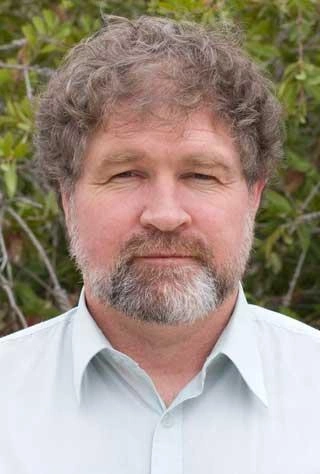Hobart launch: Director Alec Marr on seeing what's in front of us
When we started, we spent a lot of time trying to get a name called One Earth. Anyway, the person who owned that name wouldn't give it to us under any circumstances, so I said, "Let's just find another name. Forget it. Come up with something else." And (Director) Rod West came up with Kuno.
I said, "what's that?" He said "well, it's slang for the most amazing thing that ever happened in the universe." I thought - that's the name! Because if you look at the big picture the place we live on is absolutely astonishing.
This is a snapshot I took early this morning and it gives you a sense of where we are in the universe:
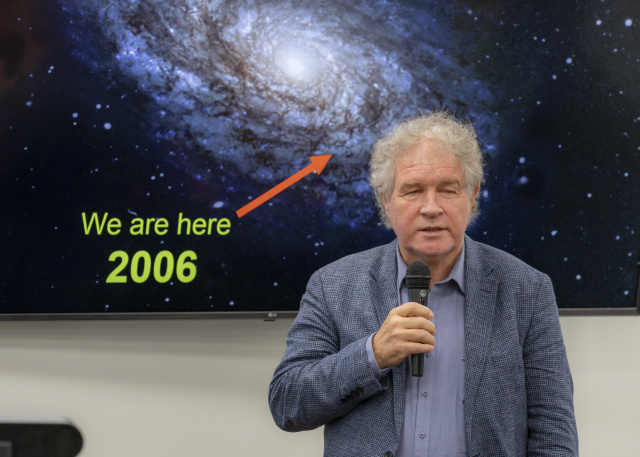
Man, we are a long way back. No one's ever heard of us. Not necessarily a bad thing. They might come and eat us if they find out about us.
The key point here is, we live on this astonishing planet where we can breathe the air, we can drink the water, we can eat the vegetation, where we are surrounded by the most astonishing wildlife doing the most astonishing things.
Next is the thing that the entire astrophysical community lost their minds over about five years ago. In 2019, the New Horizons spaceship whose job had been to survey Pluto, had had a very successful mission there, three billion miles from Earth.
They managed to get all these photos back - got the first close-up - looked at Pluto and everyone said, "Wow, this is one of NASA's greatest missions."
And then the spaceship just kept going. It didn't stop, and they're saying, "Well, what are we going to do next?" So they pointed it at this flashing object out there in the Kuiper Belt. And now there's another billion miles on the other side of Pluto, so they're four billion miles away. And after a while it arrived and there it is. That's what they found after traveling for four billion miles:
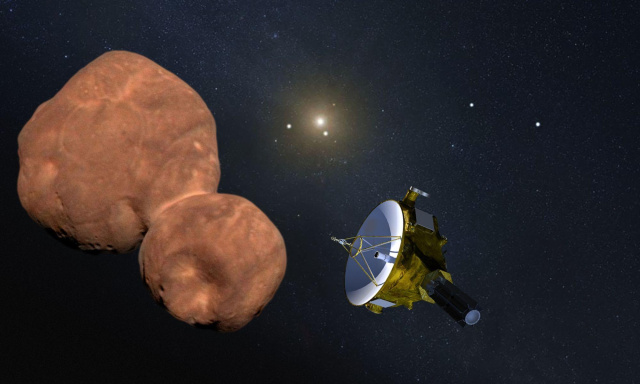
Everything else that's conceivably in our reach in our grandchildren's lifetime is an airless rock which will kill you in seconds without a space suit. But there won't be birds flying around. You won't be able to drink the water. There will be no trees or flowers. It's probably going to be an airless gravel quarry that's frozen, right?
Imagine if they docked on Mars and they saw a sulphur-crested cockatoo. They would lose their minds. Yet we walk past it every day here. People have become desensitized to what a wondrous place this place is in the world. We know of nowhere else in the universe.
It doesn't matter, all of the wondrous things that science has done to us, done for us over the last decades - yes, great achievements. But nowhere that even vaguely resembles anywhere you want to move to.
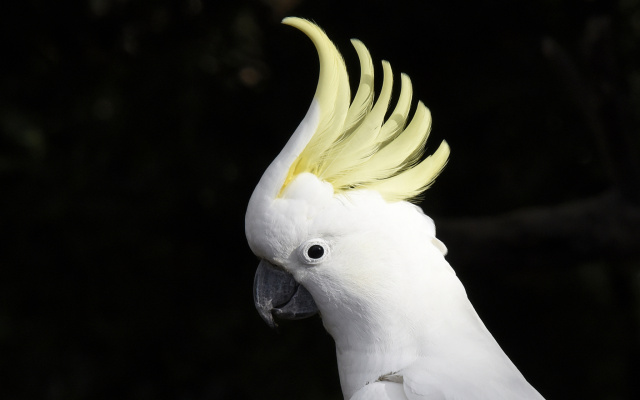
Have a look at SpaceX. Their best-case scenario is living in a field, run by a guy who can't even run a social media site. Right?
This is a really astonishing place and we are a long way from anywhere. What we are doing to it as a species is totally barking nuts. That is the only possible analysis.
Now Phill's going to show us another little bit of video. What you're about to see is something that only just came on the internet 18 months ago.
Most people will know that snow leopards are an incredibly rare leopard. They live in the
Himalayas. They're very secretive, and there's a famous book - The Snow
Leopard. Spoiler alert: the guide never got to see a snow leopard.
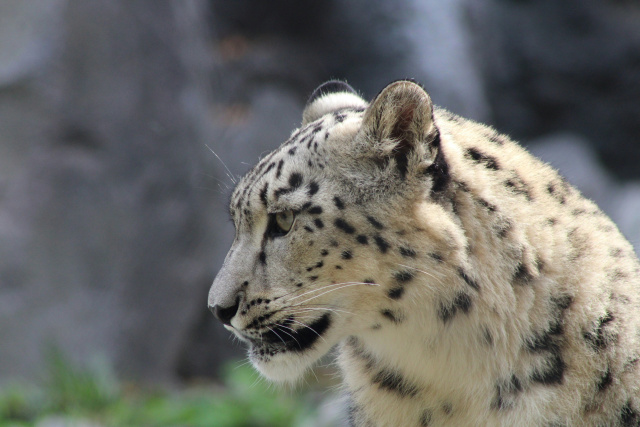
But thanks to all this modern technology... more nature photographers, better equipment, we here in Hobart can sit here and watch a snow leopard hunting. You've never seen an animal take such incredible risks.
Ten years ago, it was impossible for people like ourselves to see such things. But because of all these dedicated professionals, better equipment, drones, all sorts of things, we are starting to be able to document all these incredible things that these incredible animals do, in a way that we couldn't have done even 10 years ago.
At the moment, the internet is just scrambled eggs. What we're hoping to do here is turn Kuno into a portal to re-inspire the awe in the community, and bring it into a coherent place where it's relatively easy to find.

And of course, what we want people to do is: having got excited, to actually go out bush and turn their electronic devices off, and go and experience it. Because that is the thing that really connects people and keeps people passionate about what they do.
Now we've had a very small mention of EarthMob. EarthMob is a sister site, and its job is to help people become activists. If all we do is get people to look at our website, as far as I'm concerned that's not very much. Our job is to re-inspire people to look at the website, get excited, get out there in Nature, then come back from Nature and say, "Well, what can I do to help Nature? Ah - I'll go on to Earthmob and look for the skills and the information to help me become effective at whatever contribution I'm going to make."
At that point, then I think we're doing something genuinely useful, and it's designed to help people on the ground. We have one other rule in our organisation and that is we don't compete with anybody. Our only job is to amplify the efforts of other people.
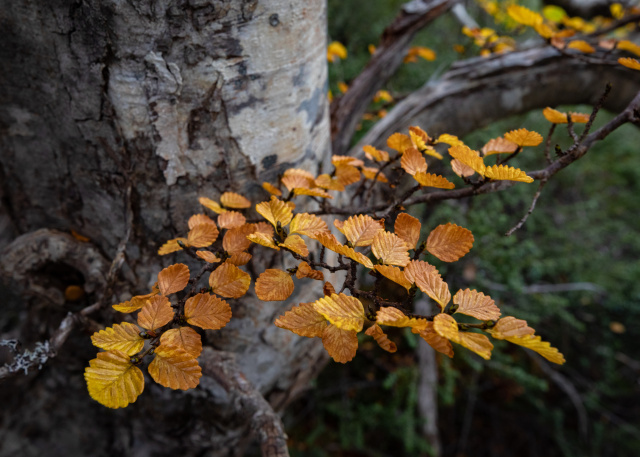
When we started, we spent a lot of time trying to get a name called One Earth. Anyway, the person who owned that name wouldn't give it to us under any circumstances, so I said, "Let's just find another name. Forget it. Come up with something else." And (Director) Rod West came up with Kuno.
I said, "what's that?" He said "well, it's slang for the most amazing thing that ever happened in the universe." I thought - that's the name! Because if you look at the big picture the place we live on is absolutely astonishing.
This is a snapshot I took early this morning and it gives you a sense of where we are in the universe:

Man, we are a long way back. No one's ever heard of us. Not necessarily a bad thing. They might come and eat us if they find out about us.
The key point here is, we live on this astonishing planet where we can breathe the air, we can drink the water, we can eat the vegetation, where we are surrounded by the most astonishing wildlife doing the most astonishing things.
Next is the thing that the entire astrophysical community lost their minds over about five years ago. In 2019, the New Horizons spaceship whose job had been to survey Pluto, had had a very successful mission there, three billion miles from Earth.
They managed to get all these photos back - got the first close-up - looked at Pluto and everyone said, "Wow, this is one of NASA's greatest missions."
And then the spaceship just kept going. It didn't stop, and they're saying, "Well, what are we going to do next?" So they pointed it at this flashing object out there in the Kuiper Belt. And now there's another billion miles on the other side of Pluto, so they're four billion miles away. And after a while it arrived and there it is. That's what they found after traveling for four billion miles:

Everything else that's conceivably in our reach in our grandchildren's lifetime is an airless rock which will kill you in seconds without a space suit. But there won't be birds flying around. You won't be able to drink the water. There will be no trees or flowers. It's probably going to be an airless gravel quarry that's frozen, right?
Imagine if they docked on Mars and they saw a sulphur-crested cockatoo. They would lose their minds. Yet we walk past it every day here. People have become desensitized to what a wondrous place this place is in the world. We know of nowhere else in the universe.
It doesn't matter, all of the wondrous things that science has done to us, done for us over the last decades - yes, great achievements. But nowhere that even vaguely resembles anywhere you want to move to.

Have a look at SpaceX. Their best-case scenario is living in a field, run by a guy who can't even run a social media site. Right?
This is a really astonishing place and we are a long way from anywhere. What we are doing to it as a species is totally barking nuts. That is the only possible analysis.
Now Phill's going to show us another little bit of video. What you're about to see is something that only just came on the internet 18 months ago.
Most people will know that snow leopards are an incredibly rare leopard. They live in the
Himalayas. They're very secretive, and there's a famous book - The Snow
Leopard. Spoiler alert: the guide never got to see a snow leopard.

But thanks to all this modern technology... more nature photographers, better equipment, we here in Hobart can sit here and watch a snow leopard hunting. You've never seen an animal take such incredible risks.
Ten years ago, it was impossible for people like ourselves to see such things. But because of all these dedicated professionals, better equipment, drones, all sorts of things, we are starting to be able to document all these incredible things that these incredible animals do, in a way that we couldn't have done even 10 years ago.
At the moment, the internet is just scrambled eggs. What we're hoping to do here is turn Kuno into a portal to re-inspire the awe in the community, and bring it into a coherent place where it's relatively easy to find.

And of course, what we want people to do is: having got excited, to actually go out bush and turn their electronic devices off, and go and experience it. Because that is the thing that really connects people and keeps people passionate about what they do.
Now we've had a very small mention of EarthMob. EarthMob is a sister site, and its job is to help people become activists. If all we do is get people to look at our website, as far as I'm concerned that's not very much. Our job is to re-inspire people to look at the website, get excited, get out there in Nature, then come back from Nature and say, "Well, what can I do to help Nature? Ah - I'll go on to Earthmob and look for the skills and the information to help me become effective at whatever contribution I'm going to make."
At that point, then I think we're doing something genuinely useful, and it's designed to help people on the ground. We have one other rule in our organisation and that is we don't compete with anybody. Our only job is to amplify the efforts of other people.

You might like...

Hobart launch: Director Dr Phill Pullinger on the power of Kuno's mission

Hobart launch: S. Group's Monica Plunkett and Javan Griffiths

Bruny Island launch: Cat Davidson on falling in love with Nature

Bruny Island launch: Bob Graham on the hidden world behind the photos
Newsletter
Sign up to keep in touch with articles, updates, events or news from Kuno, your platform for nature

